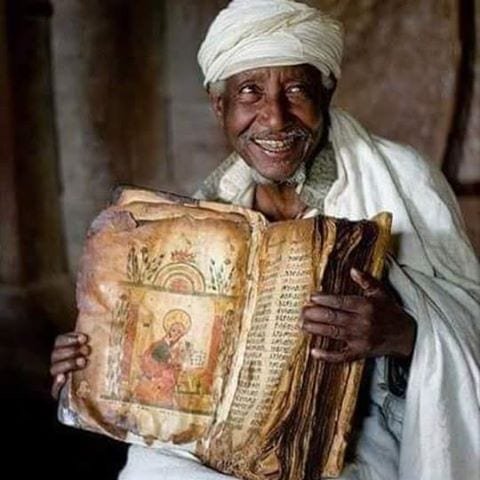In the vast tapestry of biblical manuscripts, the Ethiopian Bible stands as a unique thread, weaving through time and tradition with its distinct richness.
As scholars explore its origins and contents, a question lingers in the scholarly corridors: Could the Ethiopian Bible hold the key to revealing the mysteries of the original Bible?
The complexities and intricacies of this ancient text invite a closer examination, offering a glimpse into a world where the boundaries of religious scholarship are continuously challenged.
History of the Ethiopian Bible
The history of the Ethiopian Bible dates back to ancient times when it was originally written in Geez, an ancient Ethiopian language. This Bible, also known as the 'Abyssinian Bible,' contains a collection of 81-88 books, including the Book of Enoch, Esdras, Buruch, and all three Books of Maccabees. One remarkable aspect is that the Ethiopian Bible is almost 800 years older than the well-known King James Bible. It includes books that were excommunicated from the King James Version, making it a unique compilation.
Among the Ethiopian Bible manuscripts, the Garima Gospels are highly significant. These manuscripts are believed to be the oldest and most complete illuminated Christian manuscripts. The Ethiopian Heritage Fund has played a pivotal role in the preservation and study of these ancient texts. The New Covenant in the Ethiopian Bible includes the Book of ENOCH, which is considered a lost book in many other biblical traditions.
The Ethiopian Bible stands out as one of the most extensive versions of the Bible, encompassing texts that aren't present in other biblical canons. Its historical importance, linguistic uniqueness, and diverse content make it a valuable resource for scholars and individuals interested in exploring ancient religious texts.
Comparison With Other Biblical Manuscripts
Dating back to ancient times, the Ethiopian Bible presents a unique contrast when compared to other biblical manuscripts due to its extensive collection of books and historical significance. The Ethiopian Bible predates the King James Version by almost 800 years and contains 81-88 books, including the Book of Enoch and all 3 Books of Maccabees. Considered the most complete Bible on Earth, it was translated centuries before the Greek and Latin Bibles. Additionally, older than the Greek and Latin Bibles, the Ethiopian Bible is the oldest illustrated Bible.
- The Ethiopian Bible contains a more extensive collection of books compared to other biblical manuscripts, including unique texts like the Book of Enoch and all 3 Books of Maccabees.
- It's considered the most complete Bible on Earth, showcasing a rich tapestry of religious texts that provide a broader perspective on biblical teachings.
- The Ethiopian Bible's translation predates the Greek and Latin versions by centuries, indicating its historical importance and influence on early Christian thought and scripture dissemination.
Significance in Christian Theology
With its inclusion of extra books and unique translations, the Ethiopian Bible holds significant relevance in Christian theology, shedding light on early Christian texts and beliefs. The Ethiopian Bible contains additional books such as the Book of Enoch and the three Books of Maccabees, providing a broader scope of religious literature beyond what is found in the Hebrew or Protestant canons. The presence of apocryphal texts like the Book of Jubilees within the Ethiopian Bible offers scholars a glimpse into ancient beliefs and practices that shaped early Christian thought.
| Aspect | Details |
|---|---|
| Extra Books | Includes the Book of Enoch, the three Books of Maccabees, and other non-canonical texts. |
| Book of Jubilees | Provides insights into religious practices and beliefs prevalent in early Christianity. |
| Historical Significance | Predates the King James Version by nearly 800 years, offering a unique historical perspective. |
| Unique Translations | Uses 'Jah' instead of 'the Lord' throughout, showcasing linguistic and cultural distinctions. |
| Christian Theology | Offers valuable insights into early Christian texts and beliefs, enriching theological studies. |
The Ethiopian Bible's diverse content and historical background make it a valuable resource for scholars and theologians seeking to deepen their understanding of Christian scriptures and the development of Christian theology over time.
Preservation of Ancient Scriptures
Preserving ancient scriptures in the Ethiopian Bible involves dedicated conservation efforts to safeguard unique texts not found in other versions. The Ethiopian Bible contains distinctive books that play an important role in preserving ancient scriptures that provide valuable insights into the religious and cultural history of Ethiopia. Conservation efforts, exemplified by the meticulous care given to the Garima Gospels, guarantee the longevity and accessibility of these significant texts for future generations.
Efforts like those for the Garima Gospels demonstrate the commitment to preserving the unique books within the Ethiopian Bible.
The conservation challenges, such as delicate pages and aging materials, underscore the importance of ongoing efforts to maintain these ancient scriptures.
Impact on Modern Religious Studies
The Ethiopian Bible's unique content and structure influence the field of modern religious studies. Scholars explore its pages to uncover insights into early Christian texts, biblical canons, and theological discussions. A comparison between the Ethiopian Bible and other versions reveals variations in interpretations, shedding light on the evolution of religious practices. The inclusion of additional books like Enoch and Maccabees in the Ethiopian Bible sparks debates and influences historical perspectives.
To illustrate the impact of the Ethiopian Bible on modern religious studies, consider the following table:
| Aspect | Influence |
|---|---|
| Theological Discussions | Stimulates debates on the significance of extra books in biblical texts |
| Historical Significance | Contributes to understanding religious developments throughout history |
| Cultural Exchanges | Highlights the influence of different cultures on biblical interpretations |
| Early Christian Texts | Provides insights into the early beliefs and practices of Christianity |
Analyzing the Ethiopian Bible's historical significance not only enriches scholarly understanding but also emphasizes the importance of cultural exchanges in shaping religious traditions. By exploring the Ethiopian Bible's impact on modern religious studies, researchers uncover a wealth of knowledge that contributes to the broader field of religious scholarship.



